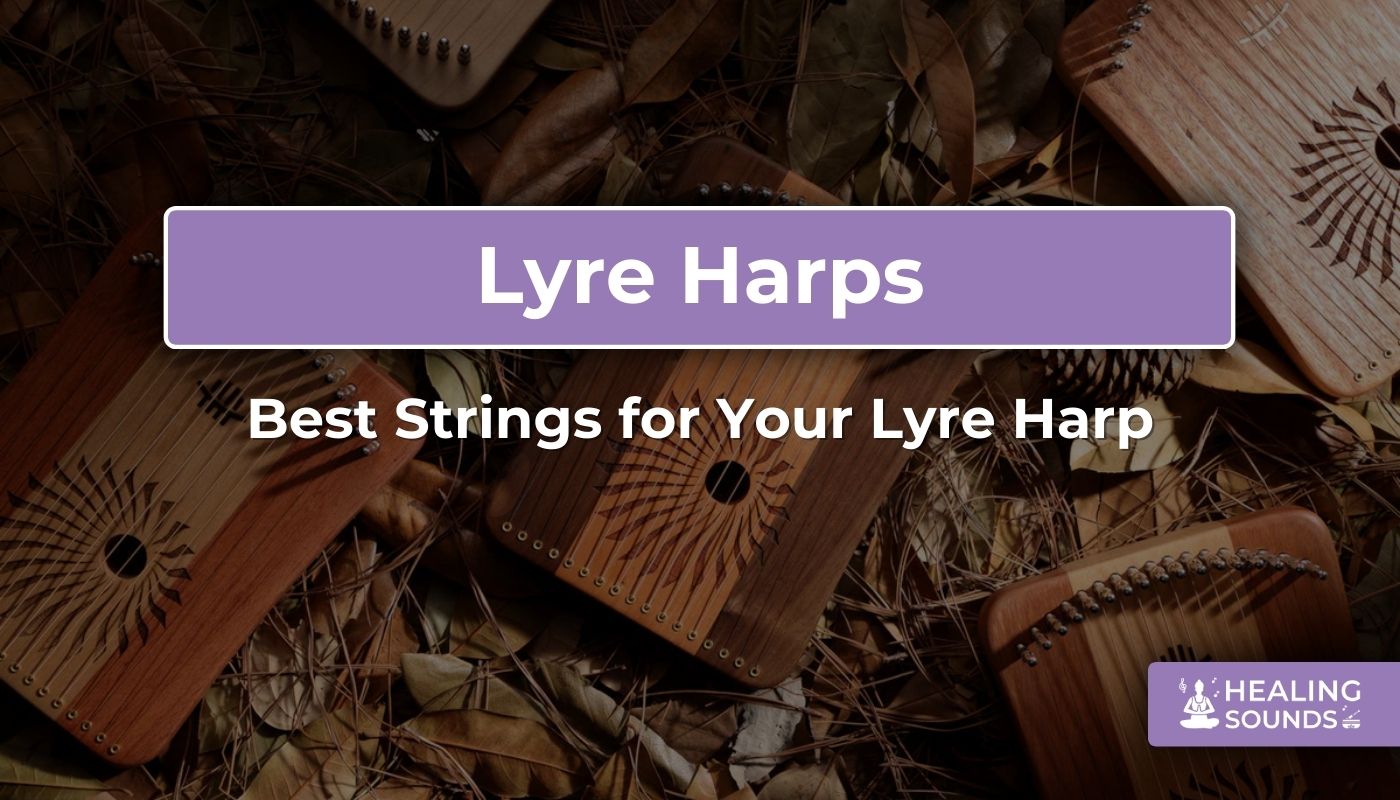Choosing the best strings for your lyre harp is crucial for unlocking its enchanting voice. Whether you're a seasoned musician aiming for nuanced expression or a beginner eager to explore this ancient instrument, the strings you select significantly impact sound quality, playability, and durability. This guide will walk you through the different types of lyre harp strings available, helping you understand how materials like nylon strings, gut strings, and steel strings shape your musical experience. Discover how to select the perfect strings to match your instrument, playing style, and sonic aspirations, ensuring every note you play rings true.
Why Your Lyre Harp Strings Matter
The strings are the heart of your lyre harp's sound. They are the components that vibrate to create music, and their characteristics directly influence the instrument's tone, volume, and responsiveness. High-quality strings designed specifically for lyre harps ensure optimal resonance and clarity, allowing the instrument's unique character to shine through.
Furthermore, the right strings enhance playability. Some materials feel softer under the fingers, making practice sessions more comfortable, especially for beginners. Durability is another key factor; choosing robust strings means less frequent replacements and more consistent performance. Ultimately, investing in the best strings for your lyre harp elevates your entire musical journey.
Types of Lyre Harp Strings Explained
Understanding the primary materials used for lyre harp strings helps in making an informed choice. Each type offers distinct sonic qualities and playing feel.
Nylon Strings: Warmth and Comfort
Nylon strings are a very popular choice, particularly for modern lyre harps and players seeking a gentler, warmer tone often associated with therapeutic sound healing. They are known for their comfortable feel, making them ideal for extended playing sessions and for beginners.
Nylon offers good durability and stability in various environmental conditions compared to gut strings. They produce a mellow, rounded sound that blends beautifully in softer musical settings.
Gut Strings: Authentic Tone
For centuries, gut strings (typically made from sheep or cattle intestine) were the standard for many stringed instruments, including historical lyres. They are prized by purists for their rich, complex, and authentic sound, offering unparalleled warmth and depth.
However, gut strings are more sensitive to changes in humidity and temperature, requiring more frequent tuning. They are also generally less durable and more expensive than nylon or steel alternatives.
Steel Strings: Brightness and Projection
Steel strings deliver a bright, clear, and powerful tone with strong projection and sustain. They are common on larger lyre harps or models designed for louder musical contexts. Steel strings are highly durable and hold their tuning well.
Their distinct brilliance can cut through other instruments in ensemble settings. While very robust, some players might find them slightly harsher on the fingertips compared to nylon or gut.

Lyre Harp Strings: 7 to 19 Strings Instrument
€14.30
Versatile replacement strings designed for various lyre harp sizes (7, 10, 16, or 19 strings), offering reliable tone and durability for consistent performance.
Explore StringsKey Factors When Choosing Your Lyre Harp Strings
Selecting the ideal lyre harp strings goes beyond just material preference. Consider these factors to find the perfect match for your needs:
Your Musical Style and Sound Goals
What kind of music do you play? If you focus on gentle folk melodies or sound healing, the warmth of nylon strings might be best. For historically inspired music, gut strings could provide the authenticity you seek. If you need your lyre to ring out clearly in a group or prefer a brighter sound, steel strings are a strong contender.
Instrument Considerations
The construction of your lyre harp matters. Some lyres are specifically designed for certain string types or tensions. Always check manufacturer recommendations if available. The number of strings (whether 7, 10, 16, 19, 24, or more) and the scale length can also influence the best string choice for balanced tension and tone across the instrument.
Durability vs. Tone Trade-offs
Consider how often you play and your tolerance for maintenance. Steel strings offer maximum durability and tuning stability. Nylon strings provide a good balance of longevity and warm tone. Gut strings offer exceptional tone but require more care and frequent replacement.
Your Budget
String prices vary. Gut strings tend to be the most expensive, followed by high-quality nylon and steel strings. While budget is important, remember that investing in better quality strings often translates to better sound and longer lifespan, potentially offering better value over time.
Explore Lyre String Options & Instruments
Experience the clear, resonant sound of high-quality nylon strings, offering durability and a smooth feel perfect for various lyre models. Learn more ➔
This beginner-friendly lyre often comes strung with comfortable strings, perfect for starting your musical journey. Ensure you choose replacement strings suitable for its size. Learn more ➔

24 String Lyre Harp Instrument with Steel Strings
€89.90
€116.90
Experience the bright projection of steel strings on this 24-string model, designed for clarity and resonance. Replacement steel strings are essential for maintaining its sound. Learn more ➔
- Beginners: Often prefer the comfort and warm tone of nylon strings.
- Authenticity Seekers: May opt for the rich, complex sound of gut strings despite higher maintenance.
- Projection Needs: Consider steel strings for brightness and volume, especially in ensembles.
- Check Your Lyre: Ensure the strings match your instrument's recommended type and tension.
Can You Use Guitar Strings on a Lyre Harp?
This is a common question, especially from players familiar with other string instruments. Generally, it's not recommended to use guitar strings (acoustic or electric) on a lyre harp. Here's why:
- Tension Mismatch: Guitar strings are designed for different scale lengths and tensions than most lyre harps require. Using them can put excessive strain on the lyre's frame or bridge, potentially causing damage.
- Gauge and Tone: Guitar strings come in specific gauges designed for guitar bodies and pickups. Their tonal properties might not translate well to the acoustic body of a lyre harp, resulting in an unbalanced or undesirable sound.
- Attachment Differences: The ends of guitar strings (ball-end or loop-end) might not be compatible with the tuning pins or attachment points on a lyre harp.
Always opt for strings specifically manufactured for lyre harps. They are designed with the correct tension, gauge, and materials to bring out the best in your instrument safely.
Installation and Care for Optimal Sound
Properly installing and maintaining your lyre harp strings is vital for sound quality and longevity. Neglecting this can lead to poor tone, tuning instability, and premature string breakage.
Proper Installation Technique
When changing strings, replace them one at a time to maintain tension on the instrument's soundboard. Ensure the string is securely anchored at the base and wound neatly around the tuning pin (usually 2-3 wraps). Avoid overtightening, especially when first bringing the string up to pitch. New strings often require a stretching-in period with frequent retuning.
Maintenance Tips for Longevity
- Wipe Down Strings: After playing, use a clean, dry microfiber cloth to wipe down the strings, removing oils and sweat that can corrode them.
- Regular Tuning: Keep your lyre harp in tune. This helps strings settle correctly and maintains consistent tension.
- Environmental Control: Store your lyre in a case when not in use, away from extreme temperatures and humidity fluctuations, which particularly affects gut strings.
- Inspect Regularly: Look for signs of wear, such as discoloration, fraying (especially near the bridge or tuning pins), or a dull sound. Replace strings promptly when they show these signs.
Understanding how strings vibrate is key to appreciating their role. The way a string vibrates creates standing wave patterns, which determine the pitch and harmonics you hear. Factors like tension, length, and mass per unit length (influenced by material) dictate these patterns. For more on the physics, you can explore resources like The Physics Classroom's explanation of standing waves.
- Wipe strings after each use.
- Tune regularly, especially with new strings.
- Store lyre properly (ideally in a case).
- Check for wear (discoloration, fraying, dull tone).
- Replace strings when worn or every few months, depending on use.
Healing Sounds: Your Source for Quality Lyre Strings
At Healing Sounds, we understand the profound connection between a musician and their instrument. That's why we offer a curated selection of high-quality lyre harp strings designed to enhance both the sound and the playing experience. Whether you need durable nylon strings for warmth and comfort, replacement sets for various lyre sizes, or specific types like steel strings for brightness, we have options to suit your needs.
Our commitment extends beyond just providing strings; we aim to support your musical and healing journey. Explore our collection to find the best strings for your lyre harp, ensuring your instrument resonates with clarity, beauty, and purpose. We stock strings suitable for many popular lyre models, including those with 7, 10, 16, 19, 24 or more strings.
Conclusion
Selecting the best strings for your lyre harp is a personal journey influenced by your instrument, musical style, and desired sound. Understanding the differences between nylon strings, gut strings, and steel strings empowers you to make a choice that enhances resonance, ensures durability, and improves playability. Remember to consider factors like your lyre's specific requirements, your playing habits, and your budget.
Proper installation and regular maintenance will ensure your chosen strings perform their best for longer. By investing in quality strings specifically designed for lyre harps, you unlock the full potential of your instrument, allowing its beautiful voice to inspire and heal. Ready to find the perfect set?
Explore the range of lyre harp strings available at Healing Sounds and elevate your musical expression today.
Frequently Asked Questions about Lyre Harp Strings
The "best" strings depend on your preference and lyre type. Nylon strings are popular for beginners and those seeking warm tones due to their comfort and gentle sound. Gut strings offer authentic, rich tones favored by traditionalists. Steel strings provide brightness and volume, suitable for larger lyres or ensemble playing. Choose based on your desired sound, playing style, and instrument's recommendations.
Lyre harps come in various sizes. Common configurations include 7, 10, 16, 19, or even 24 strings or more. Historically, ancient lyres often had fewer strings (like 7 or 9). Modern lyres offer a wider range to expand melodic possibilities. The number of strings doesn't dictate quality; choose based on the musical range you desire and your playing level.
Historically, lyres could have varying numbers of strings, with 7 and 9 being common configurations in ancient Greece. However, modern lyre harps are available with many different string counts, ranging from 7 up to 30 or more. There isn't one single standard number.
Tuning for a 7-string lyre often follows diatonic (major scale) or pentatonic scales. Common tunings might be C major (C-D-E-F-G-A-B) or G major (G-A-B-C-D-E-F#), or a pentatonic variation like C-D-E-G-A-C-D. The specific tuning depends on the music you want to play and the instrument's design. It's best to consult resources specific to your lyre model or desired musical tradition.
It is generally not advisable to use guitar strings on a lyre harp. Guitar strings are designed for different tensions, scale lengths, and tonal responses. Using them can potentially damage your lyre or result in poor sound quality. Always use strings specifically manufactured for lyre harps to ensure correct fit, tension, and tone.



